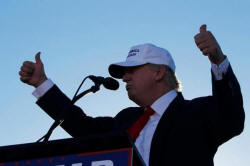|
U.S. options market not
very 'Trumped up' ahead of vote
 Send a link to a friend
Send a link to a friend
 [October 24, 2016]
By Saqib Iqbal Ahmed [October 24, 2016]
By Saqib Iqbal Ahmed
NEW
YORK (Reuters) - Prospects that the presidential election will inject a
hefty dose of volatility into U.S. stock markets are fading fast as
Republican Donald Trump's victory odds lengthen.
A reading of positioning data on options tied to the benchmark S&P 500
index shows little pickup in demand for contracts that would offer
investors downside insurance in the event that stock prices take a major
hit right after the Nov. 8 election.
Moreover, based on options term structures - calculated from prices of
options with different expirations - it is hardly evident at all that
investors are positioning for an uncertain outcome, even with Election
Day barely two weeks away, Michael Purves, head of derivatives research
at Weeden & Co, said.
"There had been a modest premium bump for November options a few weeks
ago, but that seems to have faded steadily with Trump's slide in polls,"
Purves said.
In a Reuters poll of equity strategists earlier this month, a victory by
Democrat Hillary Clinton was viewed as the more positive outcome for
stock prices in the near term.
Trump's chances of defeating Clinton to capture the White House have
diminished markedly over the last several weeks, according to most polls
and prediction markets.

The Reuters/Ipsos States of the Nation project, which uses an online
opinion poll to project election outcomes in all 50 states, estimates
that Clinton has a better than 95 percent chance of winning the minimum
of 270 Electoral College votes to claim the presidency if the election
were held today. The most likely outcome would be 326 votes for Clinton
to 212 for Trump.
On PredictIt, a popular online predictions and betting market, Clinton's
implied chances of victory have risen to around 80 percent from around
63 percent a month ago.
NO RUSH FOR INSURANCE
The lack of positioning for an election-related volatility shock is
consistent across the options market.
"I just don't see a whole lot of shifting of positions. I don't see
people taking on a very bearish stance or anything like that. It's a
little bit surprising," said Randy Frederick, managing director, trading
and derivatives at Charles Schwab, Austin, Texas.
"If it was a much closer race it might have been a different story, but
the polls have Hillary Clinton in a pretty solid lead right now and the
market seems to be on board with that idea," Frederick said.
A Brookings Institution study published on Friday from two U.S.
economics professors concluded that a Clinton victory would further
suppress stock market volatility, whereas a Trump victory would send it
soaring.
Justin Wolfers, of the University of Michigan, and Eric Zitzewitz, of
Dartmouth College, said recent market reactions to pre-election events,
including the first Trump-Clinton debate and the release of a video of
Trump making vulgar comments about women, signal that equity volatility
could fall by 15 to 30 percent with a Clinton win. (http://tinyurl.com/zl4ew4u)
TRUMP "INSURANCE" IS CHEAP
While the options market might be only a moderate catalyst for the S&P
500 index, individual sectors such as healthcare and energy might be
more prone to election-related volatility, derivatives analysts at
Deutsche Bank said in a recent note.
[to top of second column] |

Republican U.S. presidential nominee Donald Trump holds a campaign
rally in Naples, Florida, U.S. October 23, 2016. REUTERS/Jonathan
Ernst

And
just because investors are not braced for election-linked stock gyrations is no
guarantee that markets will remain calm, analysts said.
Given that the market is not pricing a lot of volatility for November, the
absence of positioning could aggravate a volatility shock in the event of a
surprise result.
"If
you think Trump will win, you want to get long SPX puts or long CBOE Volatility
Index calls right now as protection," said Purves, referring to options
contracts that profit from a jump in volatility.
A clean sweep by the Democrats of the House of Representatives, the Senate and
the White House could also unleash volatility, Purves said.
Indeed, there is a very modest skew toward protective put options over more
bullish calls among contracts expiring near the election. For S&P 500 index
weekly contracts expiring on Nov. 11, puts outnumber calls by a 2.1-to-1 margin,
compared with 1.9-to-1 for all expirations, according to Thomson Reuters data.
Prices for at-the-money put and call contracts that expire on the eve of the
election suggest a 1.8 percent move, up or down, in the S&P 500 by then, while
comparable contracts expiring later that week see an up or down move of 2.1
percent.
Nonetheless, demand for volatility protection remains low and such options are
relatively cheap, and getting cheaper.
For instance, the cost for an S&P index option conveying the right to sell an
S&P index future at the 2,050 level, about 4 percent below Friday's close, and
expiring on Nov. 9, the day after the election, has plunged from $12.42 on
Monday to $4.80 on Friday, a 61 percent decline.
With Trump trailing in opinion polls, the focus ahead of the Nov. 8 vote is
shifting to whether Republicans can keep their narrow majority in the Senate or
even their larger advantage in the House of Representatives.


"Gridlock is the most market friendly outcome, and that is what the options
market seems to be anticipating," Purves said.
(Reporting by Saqib Iqbal Ahmed; Editing by Dan Burns and Leslie Adler)
[© 2016 Thomson Reuters. All rights
reserved.] Copyright 2016 Reuters. All rights reserved. This material may not be published,
broadcast, rewritten or redistributed. |